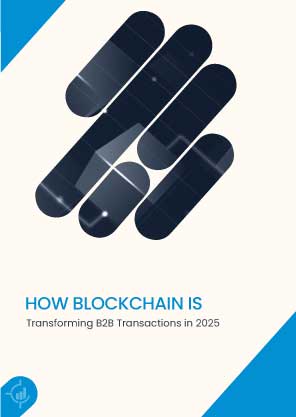or call: +1 (845) 347-8894

or call: +1 (845) 347-8894

What if every deal your business made was instantly verified, recorded, and trustless – no emails, no middlemen, no delays? That’s not a futuristic vision. It’s already happening. In 2025, blockchain has moved far beyond cryptocurrency headlines to become a foundational tool for B2B transactions across industries. From automating contracts to streamlining cross-border payments, companies are using blockchain to build faster, more secure, and more transparent business relationships.
B2B cross-border transactions using blockchain are expected to hit 745 million globally in 2025, with Europe handling 466 million and Asia contributing over one-third. Whether you’re a manufacturer in the U.S. or a distributor in India, blockchain is changing how business is done, with speed and trust built into every step. Let’s see how blockchain is revolutionizing B2B transactions in practical ways and why it’s relevant now.
How businesses collaborate has evolved significantly over the past few years. With more partners, more digital systems, and more cross-border transactions, pressure to do so faster and more intelligently has increased. But most companies are still bound by old ways of working: lengthy email chains, error-plagued spreadsheets, and disconnected systems.
Blockchain is well-suited to this new world. It allows a collaborative digital ledger that tracks every stage of a transaction from contract, through payment, to delivery, in a manner that all parties can see. Once something has been added, it cannot be altered without consensus. That provides a shared version of the truth that everyone can rely on.
This works particularly well for companies with several layers of suppliers, such as manufacturing, pharma, or electronics, where incorrect communication could lead to severe delays. With blockchain, there is no need to speculate on who did what and when; it’s all documented.
Smart contracts automate business transactions. Rather than having to wait for someone to verify a delivery or send an email before processing a payment, smart contracts do it all on their own. They are digital “if this, then that” instructions that reside on the blockchain.
Suppose a shipping firm promises to deliver an item to a customer on a specific date. A smart contract can be programmed to pay the moment the GPS tracks verify that the package has arrived. No paperwork reminders or delays.
This type of automation assists teams with minimizing repetitive work and diminishing back-and-forth between units. It also decreases opportunities for human miscalculation or conflicts, thus making business processes smoother and faster as a whole.
One of the largest problems with global supply chains is that businesses only get to see one part of the picture. A supplier might know when the product departs their warehouse, but not its arrival. A buyer may not be aware if components originated from an authorized source. Blockchain remedies this by providing a single, unified view for all parties.
Every product’s journey from raw material to end user is tracked step by step. Everyone in the chain has access to the same real-time updates, and changes are registered instantaneously. This is particularly useful in those industries where traceability is paramount, such as food, drugs, and electronics.
For instance, when a batch of food is discovered to be unsafe, blockchain can identify specifically where the problem originated, eliminating unnecessary time and wastage. Blockchain in 2025 also enables businesses to demonstrate to customers that their products have proof of ethical sourcing, fair labor practices, or sustainability, fostering greater trust in the brand.
When companies make international payments, things can become complicated. There are various banks, currencies, time zones, and regulations to navigate. Transactions may take days, and fees can add up quickly.
Blockchain alters that. Rather than routing through multiple banks and clearinghouses, companies can utilize blockchain platforms to transfer payments directly, securely, and in many cases, within minutes. This is particularly beneficial for firms that make recurring payments to overseas suppliers or partners.
These transactions are also accompanied by built-in records, which means they can be audited and verified with ease. And since the system is decentralized, it won’t be held back by a single point of failure. That means companies have more control and predictability over how they handle cash flow.
In the B2B universe, how you know who you’re working with really matters. But it takes slow, repetitive, and risky identity checks to find out. It’s not safe or effective to send passport scans or tax forms via email. With blockchain, businesses can verify and share identity details more securely. Digital IDs stored on a blockchain can confirm someone’s credentials without exposing all their data. It’s kind of like showing your driver’s license to prove your age, without revealing your home address.
This makes it faster to onboard new vendors or partners and decreases the risk of fraud. In high-trust industries, such as banking, healthcare, or government contracting, this technology makes it possible to maintain fast and secure sensitive transactions.
Purchasing goods or services from other companies was once a paperwork-intensive activity. Departments were required to deal with quotes, contracts, invoices, and delivery notes, many of which were in several systems. It was simple for errors to fall through the cracks.
Blockchain systems now assist businesses in managing procurement more efficiently. Each action from request to receipt is recorded and transparent to all authorized users. Businesses can see which suppliers are performing against contract terms and which suppliers are lagging behind. They can also eliminate redundant orders or overlooked payments.
Procurement staff save time spent on follow-ups and have more time to make strategic choices. It also becomes simpler to make suppliers accountable and negotiate improved terms in the long term.
One of the reasons that businesses waited to utilize blockchain technology in the past was that various platforms were unable to communicate with one another. If your supplier worked with a different blockchain, it was difficult to send data or synchronize transactions.
That’s not true anymore. In 2025, new software will allow blockchains to interface with the business applications businesses are already using, such as CRMs or ERPs. APIs (application programming interfaces) enable bringing blockchain data into the tools that teams work with daily.
This allows a business to utilize its preferred blockchain and still integrate with partners who utilize other platforms. No longer must you choose between function and compatibility; you can have both.
Blockchain is not limited to a particular industry. It’s being applied across numerous industries where B2B relationships are central to the business:
Factories use blockchain to trace parts from suppliers, log inspections, and track inventory movements in real time. This helps meet safety standards and plan production more efficiently. It also reduces delays caused by miscommunication and allows quicker responses to quality issues. Manufacturers can share verified data with partners without risking sensitive information.
Pharma companies track medicines from labs to clinics to prevent counterfeits. Hospitals verify supplier credentials and manage vendor contracts with less risk. Blockchain also helps maintain patient data privacy while allowing secure information exchange between authorized parties. This leads to safer drug distribution and faster regulatory compliance.
Retailers use blockchain to prove product authenticity, manage deliveries from global suppliers, and automate supplier payments based on delivery confirmations. It also enhances customer trust by providing transparent supply chain histories. Retailers can quickly identify and resolve issues with shipments, reducing stockouts and improving satisfaction.
Shipping companies use it for smoother customs checks, shipment tracking, and verifying delivery routes—all without manual updates or paperwork. Blockchain reduces paperwork errors and speeds up clearance processes at borders. It enables real-time collaboration between carriers, customs agents, and clients, cutting down delays and costs.
Utility providers are using blockchain to manage power trades, track usage across regions, and settle bills faster with smart contracts. It supports peer-to-peer energy trading, allowing businesses to buy and sell excess power directly. Blockchain also improves transparency in renewable energy credits, helping companies meet sustainability goals.
Despite blockchain’s giant leaps, some speed bumps still exist. Public blockchains sometimes slow down when everybody tries to get on at the same time. Not all industries have come to standardize on common practices, which can complicate setup.
Privacy is also an issue. Companies want to provide enough information to establish trust, but not so much that their competitors get to view delicate details. Deploying blockchain on existing systems can be slow and costly, as well.
And then there is the regulatory aspect. Digital contracts and foreign payments must comply with legislation that is lagging behind the technology. Companies need to be attentive to keep compliance from becoming a problem.
If you’re a business leader venturing into blockchain, begin by choosing one segment where it might be useful. Perhaps it’s paying suppliers. Perhaps it’s tracking contracts. Pilot it with a small segment and scale up once you witness the outcomes.
Joining industry associations can keep you ahead of standards and prevent you from building alone. It’s also an investment worth making in training your staff on how to use this technology in ways that benefit your company.
Lastly, be practical. Concentrate on concrete business results. Don’t pursue buzzwords. Utilize blockchain wherever it offers definite value and bypass it wherever it doesn’t.
Blockchain is not a fad. It’s becoming an integral part of the way businesses do business and cooperate. With it, businesses can create faster, more transparent, and more trustworthy partnerships.
In a world where trust and speed are more important than ever, blockchain enables companies to eliminate uncertainty and establish trust on every transaction. And although the technology will continue to change, the message is clear: Companies that adopt it now will be more responsive, more secure, and better positioned for the future.
Blockchain is a shared digital ledger where multiple parties can record, view, and verify transactions in real-time. In 2025, it’s helping B2B businesses cut delays, reduce paperwork, and build trust by giving everyone access to the same verified data, without relying on intermediaries.
Smart contracts are self-running agreements stored on a blockchain. They automatically carry out tasks like releasing payments once delivery is confirmed. This reduces manual follow-ups, speeds up transactions, and lowers the chances of disputes or errors in B2B transactions.
Yes. Blockchain brings real-time tracking and transparency to every stage of the supply chain. It helps companies verify product origins, monitor shipping conditions, and respond quickly to delays or recalls, all while reducing fraud and miscommunication.
Traditional international payments can be slow and expensive. Blockchain enables direct, secure transfers in minutes instead of days, with lower fees and clearer tracking. It’s especially useful for B2B firms working with partners in different countries and currencies.
Blockchain protects data by encrypting it and recording it across a decentralized network. Only approved parties can view or update information. This reduces the risk of tampering or data leaks, making it safer than traditional record-keeping methods.
To participate in our interviews, please write to our IntentTech Media Room at sudipto@intentamplify.com




